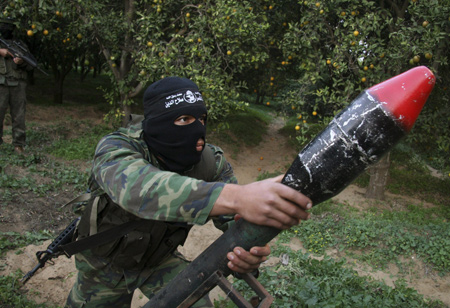UPDATES
Rocket Attacks, Hamas and Israeli Deterrence
August 31, 2011 | Tzvi Fleischer

Rockets continue to be fired at Israel from Gaza, despite yet another ceasefire being called on the weekend. One rocket hit Israel on Monday, while two were fired on Sunday. (Meanwhile, Israel is also on alert for another terror attack from Gaza, possibly over the Sinai border.)
Those daily rockets don’t get reported much in the Australian media unless the numbers are unusual or someone gets killed, or Israel launches a notable counter-strike. It’s almost as if they’re expected or normal.
For that reason, AIJAC recommends a new twitter feed – QassamCount – which provides realtime info on all of the rocket attacks, including where they hit and any damage done. Follow it here.
Most commentators seem to think that Gaza’s Hamas rulers want a ceasefire and they certainly keep calling them. They also keep claiming that they have the promise of smaller groups like Islamic Jihad and the Popular Resistance Committees to stop shooting as well. So why do rockets keep falling?
Haaretz’s usually insightful Palestinian Affairs commentator Avi Issacharoff explains what is really going on:
Some members of Hamas’ military wing support the small organizations and rocket/suicide attacks on Israel; others oppose them. Hamas turns a blind eye to some of the Islamist organization members because they used to be in Hamas. Meanwhile, it persecutes other extremist groups.
Hamas’ political leadership in Gaza does not want an escalation, but because of its decentralized structure, each sector makes different decisions. The differences are apparent in the West Bank as well. Whereas top Hamas officials say they do not want to see a resumption of suicide attacks from the West Bank, some members of the organization reject this policy.
Issacharoff noted something else important too. There is a cost to be paid – in terms of Israel’s ability to deter future attacks – for the relative restraint Israel has shown in the face of the intensified rocket attacks of the past week and a half:
The Israeli media praised politicians, notably Barak and Netanyahu, for showing restraint after the terror attack and the rocket attacks on Ofakim, Be’er Sheva and elsewhere. Hamas, Islamic Jihad and others interpret this as “the Israelis are afraid.”
In contrast to Operation Cast Lead, when Israeli deterrence halted organizational activity in Gaza, it’s likely that after the latest round, the Hamas operatives and the rocket squads – who are probably not under any supervision – will be more inclined to squeeze the trigger.
Issacharoff also has a lot of good insights into what is going with respect to Sinai and Egypt as well, including the likely role of the Egyptian military in the terror attacks near Eilat on August 18. He notes:
A Haaretz investigation found a high probability that the attack was not only planned and executed under the nose of the Egyptian police, but that some policemen may have been handsomely paid by the terrorists to ignore what was happening immediately below their border outpost.
Read all that Issacharoff has to say here.
Speaking of Egypt, another piece in Haaretz by American writer James Kirchick reports from Cairo on the overwhelming, violent hostility to the Jewish state there. After reporting on antisemitic chants at the demonstration outside the Israeli Embassy, Kirchick comments:
Anti-Semitism is the common political language in Egypt. It is the one thing on which all the major political factions can agree – from secular “liberals” to Islamists. While they’ll say the most awful things about each other behind closed doors, the one group these two will happily slander in public are Jews or Israelis. For instance, two months ago, at a conference in Budapest sponsored by the Tom Lantos Institute and the Center for Democratic Transition, the vice chairman of Egypt’s legendary (and ostensibly “liberal” ) Wafd party declared that “the Holocaust is a lie” and that Anne Frank’s diary is a forgery. “Gas chambers and skinning them alive and all this?” he asked rhetorically. “Fanciful stories.”
A remark like this in a Western democracy would result in the end of one’s political career, if not a jail sentence. But “anti-Semitism remains the glue holding Egypt’s disparate political forces together,” according to the young Egyptian writers Amr Bargisi and Samuel Tadros, whose prescient article two years ago, “Why are Egypt’s ‘Liberals’ Anti-Semitic?,” caused a stir back home.
He goes on to argue that Israel cannot hope to influence this hatred through concessions to the Palestinians or anything else, and the best Israel can hope for is that Egyptian politics will be too busy with the country’s considerable domestic problems for Egyptians to act on their hatred. Again, his full essay is highly recommended.
Tzvi Fleischer
Tags: Egypt





